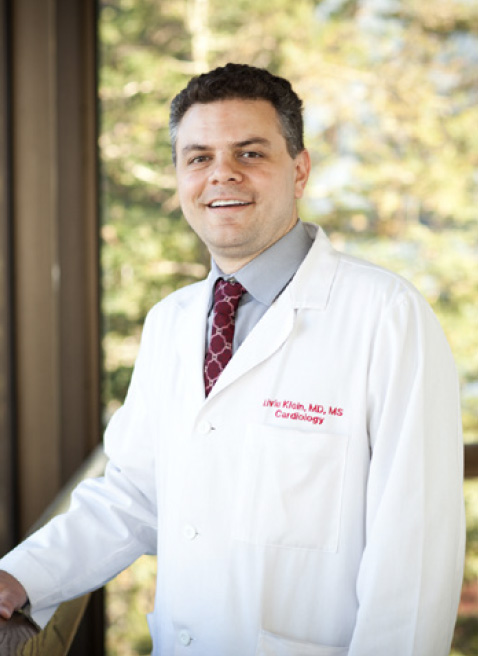Discovering the Long-Term Effects of COVID
COVID can impact the heart in two main ways,” said Liviu Klein, MD, MS, director of the UCSF Mechanical Circulatory Support program and an expert in advanced heart failure and cardiac transplantation.
First, some patients may develop heart disease when they initially present with COVID-19. This could include myocarditis, which is inflammation of the heart muscle; or vasculitis, which is inflammation of the blood vessels feeding the heart muscle. These conditions could progress to cardiomyopathy, or weakening of the heart muscle, and in rare cases, full-blown cardiogenic shock – a condition in which the heart is suddenly unable to pump enough blood. Other patients may develop abnormal heart rhythms like atrial fibrillation.
Second, cardiologists are just starting to learn how some COVID-19 patients may experience chronic effects on the heart even after they have recovered from the virus. For example, a recently published German study followed about 100 patients whose average age was 50. Most had recovered from COVID after experiencing mild to moderate symptoms of the disease, and only a few had required intensive care. Two months after their initial COVID-19 diagnosis, all of them underwent cardiac magnetic resonance imaging (MRI), a very detailed test which can reveal information not detectable with other types of imaging.
“By all measures, most of the patients were perceived to be low-risk,” said Dr. Klein. “Some patients had high blood pressure, diabetes or coronary disease, but most didn’t have any heart disease risk factors. So it was quite surprising that about 80 percent had abnormal findings on their cardiac MRIs.”
Those abnormalities included inflammation, or inflammation plus scarring – which meant that part of their heart muscle was essentially dead, presumably from their COVID-19 infection. Some of the patients with inflammation or scarring also underwent heart biopsies, which confirmed that the patients had active inflammation.
“How are we as cardiologists going to follow these patients over the long-term?” asked Dr. Klein. “It shows that even though they made it through the acute event of having COVID-19, they may not be out of the woods.”

Photo credit: Noah Berger
Learning Over Time
Similarly, another study based in Europe studied 1,200 COVID patients with an average age of 60. “Half of the patients had abnormal echocardiograms, but less than 10 percent of the patients had clinical manifestations of heart disease, such as a heart attack, cardiomyopathy or myocarditis,” said Dr. Klein. “The bottom line from both these studies is that these patients need to be followed long-term with repeated studies of the heart. Right now we don’t know if that’s for six months, a year, two years, or more.”
These sorts of silent effects are not limited to the heart. “There are elegant studies looking at the lungs of COVID patients who tested positive but had no symptoms,” said Dr. Klein. “A randomly selected sample received CT (computed tomography) scans of the lungs, and surprisingly, those patients actually showed lung damage.”
So much remains to be learned about the long-term impact of COVID-19. “The vast majority of patients infected with COVID don’t have a clinical presentation, and we don’t know their cardiac involvement,” said Dr. Klein. “In people who are symptomatic, most of them have mild to moderate symptoms and can recover at home. What’s worrisome is the long-term consequences, which seem to be quite serious for patients who recover from this infection. That’s where we as cardiologists will need to do a lot of work in the future.”
As troubling as this is, Dr. Klein is still hopeful. “There are probably over 100 clinical trials in progress throughout the world, and it’s interesting how this disease has mobilized resources, academia, industry, and regulatory bodies,” he said. “COVID-19 has created a lot of tragedy and mortality, but at the beginning of the year we didn’t even know that this virus existed, and now we have five companies testing vaccines. The amount of progress in therapeutics, diagnostic testing, and treatment, and how fast these have been tested in clinical trials, is just unprecedented.”
- Elizabeth Chur, Date Published: Fall 2020
